|
10/7/2023 0 Comments Saturday Afternoon Craft Talk...
...if you'll indulge me.
This will be focused not on prose, necessarily, but on the blending of words, inspired by a lyric I can't stop thinking about. But first, a digression: At Christmas last year, my wife gave me a lot of stuff for my home office, knowing I would be starting a new job early in the new year. Chief among these gifts was a turntable, which has gone on to spur some prodigious purchasing of vinyl. Old stuff, mostly, but some new, too. One of the latter is the latest from Ben Folds, titled What Matters Most. I love this album. Love. It. And no song holds my adoration more than the last one of Side A, called "Kristine From the 7th Grade."
The song—about ending up on the mailing list of a QAnon-style conspiracy theorist the narrator remembers with fondness from long ago—has all the wonderful Folds touches that I've admired for almost half my life: melancholia and tenderness and empathy and yearning. It also has a sentence construction that just enchants me:
I got the emails these last two years, every day...
There's something about the order of things here that gives me the same spinal tingle I experience when I read a moving passage of prose, or hear a line delivered just so on film, or what have you. A journalist might be inclined to rearrange the boxcars into a more orderly procession: I got the emails every day for the last two years. But to my way of thinking, the magic goes right out of it if you do that. The point here is every day. It's the punctuation. The two years might have been endured if not for the every day. Paired with Folds' inimitable ability to tap into the emotion of what he's singing, the whole effect is purely and sadly beautiful.
Now, I don't know enough about songwriting to say with any authority what Ben Folds was aiming for here. Any number of factors could have influenced his decision about ordering the words. All I know is the feeling his choices, arranged this way, draw out of me. When my wife and I got together, we talked a lot about writing, which shouldn't surprise anyone. But as we dug into craft and habit and the rest, we also talked about what we admire in each other. I'll always be moved by her telling me that I arrange things in surprising patterns, with combinations and riffs that it wouldn't occur to her to try. (And why should she? Elisa is already a great writer.) I can't say I do so with any sort of overarching plan: By God, even if it kills me, I'm going to arrange these words in surprising patterns. But I do listen to the beats and consider the light and color of what I'm writing as much as I do what the words actually mean. It makes a difference. At least to me. In Parting...
It's Saturday, October 7, and I'd much obliged if you'd hold a thought for the authors who have descended on Billings, Montana, this weekend. It was nearly a year ago to the day that I white-knuckled it through panel discussions and a lovely banquet, waiting to find out if And It Will Be a Beautiful Life had won the High Plains Book Award for fiction.
It had, which still fills me with wonder and gratitude.
A year has gone by, and 37 more books—spanning 13 categories—by some really terrific authors are up for consideration. In a short period, the High Plains awards have become among the most sought-after regional literary prizes in the country. It's quite an event and quite an honor.
Please send your best wishes to everyone who made it this far.
0 Comments
7/15/2023 0 Comments Saturday Morning Craft Talk**--First in a series, if I can remember to do them. I've been posting these for years on Facebook. This is a better home for them. I write fiction in a linear way (so far, at least). I start at the beginning of my idea and write, in some number of sessions, until I reach the end of it. Now, certainly, in subsequent drafts, I'll sometimes move scenes around, delete things altogether, write intervening chapters, whatever. But for first-draft purposes, to this point, I begin at the beginning and end at the end.
Several states of mind tend to accompany this not terribly unusual method of work. Among them are the thrill of having gotten started, the initial burst of industry, the where-the-hell-am-I-going-and-how-the-hell-am-I-gonna-get-there uncertainty of the thick middle, the crises of confidence, and the relief of busting through the boulders in my path. Then there's the final stretch, when I can see the end out there in the distance like a beacon but I'm still some miles away. My foot grows heavy on the gas. I rush. The care I take earlier in the draft, when I'll double back to previous chapters and scenes and buff them with a chamois cloth, falls away. I grow restless with the journey and bear down on that point in the distance, waiting for it to grow larger on the other side of the windshield. I stretch, hard, so I can feel the cocaine rush of typing "The End." Subsequently, I often find that my second (and third, and fourth ...) drafts are unbalanced affairs: light touchups at the beginning, where I've been more deliberate and careful, and massive reworking in the final chapters, where I've been hasty and over-eager. All of this is an overly long way of saying that the 500 pages I printed out in March and set on the edge of my work table are calling to me. It took me nearly eight years of start-again/stop-again work to draft the damn thing. The first third is good, for as much as I've touched it. The middle is sturdy, if in need of some polish and targeted fortification. The end? I have work to do. Back I go ... 2/19/2023 4 Comments Compromising with the ClockI'm more than a month into my new full-time job--more on that here—and have settled into a rhythm that both suits and serves me. This weekend has been the first time in that month-plus that I've been able to turn my attention to my current manuscript, which makes it, perhaps, a longer absence than I anticipated. But, hey, career changes are big deals. My focus has been in the right place. The biggest change, aside from the parameters of the job, has been to my sleep schedule. I've spent the preponderance of a career as a swing-shifter—4 or 5 p.m. to midnight or 1 a.m. In my younger days, I embraced the full inversion of that schedule. I'd come home, make dinner, fire up the TV, talk on the phone, whatever, then go to bed around 5 a.m. or 6 a.m. Wake up after noon, eat breakfast, head off to work. Lather, rinse, repeat. Later on, I realized how much of the day was getting away from me that way and adjusted. Home, directly to bed, wake up at 7 a.m. or so, have hours and hours to my own devices before I headed to work. I wrote a lot of novels that way. Back in January, my thinking was along these lines: I'll wake up at 5:45 a.m., write, eat breakfast, then start my workday. 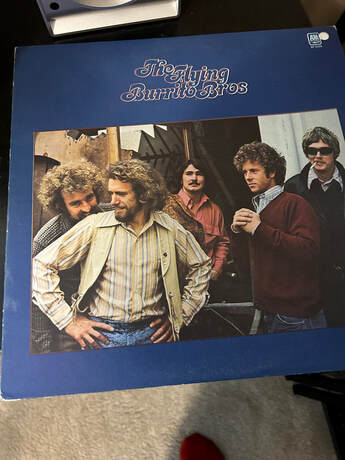 It hasn't worked out that way. Oh, I'm waking up early. And I'm answering email, paying bills, doing whatever can be done when much of the world is asleep, then reporting to duty in my sweet home office. (Seriously, my office is the BEST. I'm sitting here at the short end of the L-shaped desk, writing this as a warmup to today's work on the manuscript, and listening to the Flying Burrito Brothers on vinyl. You tell me how life could possibly be better. I dare you.) When I get off work in the early evening, I'm too fried to write. I eat, I visit my dad, I tend to small errands, then I trudge upstairs for another go-round with Mr. Sandman. Can't write in the morning, so what to do? Easy. Write on weekends. I have no absence of motivation to do so, and no absence of weekends to put those writing hours into. Point is, I can write a lot of novels this way, too. 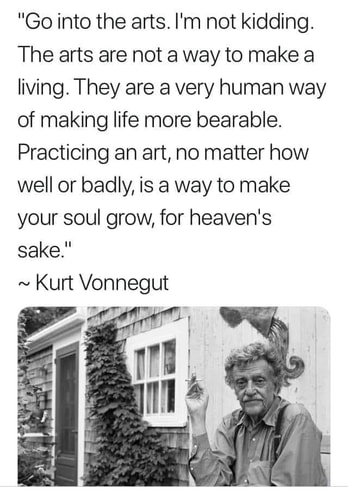 The whole thing puts me in mind of a meme I shared on Facebook this past week, one that got a lot of traction with my artist-heavy social group. And it's something, perhaps, I don't focus on enough when I'm putting my hopes on this book or that book to connect widely and to ratchet down the financial pressures of daily American life. I don't do it for money. And I say that in a non-starry-eyed way, and in a way that's not too idealistic for my own good. The point is that being compelled toward the arts comes from a deeper place, a deeper need to make sense of the world and to contribute something to it that doesn't traffic in cynicism and power. Do I wish I had a better nose for generating straight cash, or that maybe I'd made different decisions along the way that would have augured more to the benefit of my bottom line? Sure. Absolutely I do. But I'm not dead yet. There's still time. Once I started getting comfortable with the multiplicity of ways I can define myself, it released me to embrace my multitudes. I can be an analyst and a content specialist. I can be a friend and a husband. I can be a brother and a son and an uncle. And, damn right, I can be an artist on my terms, in my time, trying to make a contribution from my cozy little office with a turntable and a drink fridge. I not only can but also am gonna. Just watch me. 1/9/2023 0 Comments On Turning the PageAs I write this, it's late morning on Sunday, January 8, and I have spent an entire week living my new schedule. It looks something like this: 5:45 a.m.: Wake up, shower, tend to the dog, have some juice. 6:15 a.m.: Head downstairs to my office and begin writing. 7:30-7:45 a.m.: Head upstairs for breakfast. 8:30 a.m.: Start the rest of my workday. The rest of my workday is the part I've been waiting on. If this post is up and you're reading it, I've at last begun it. 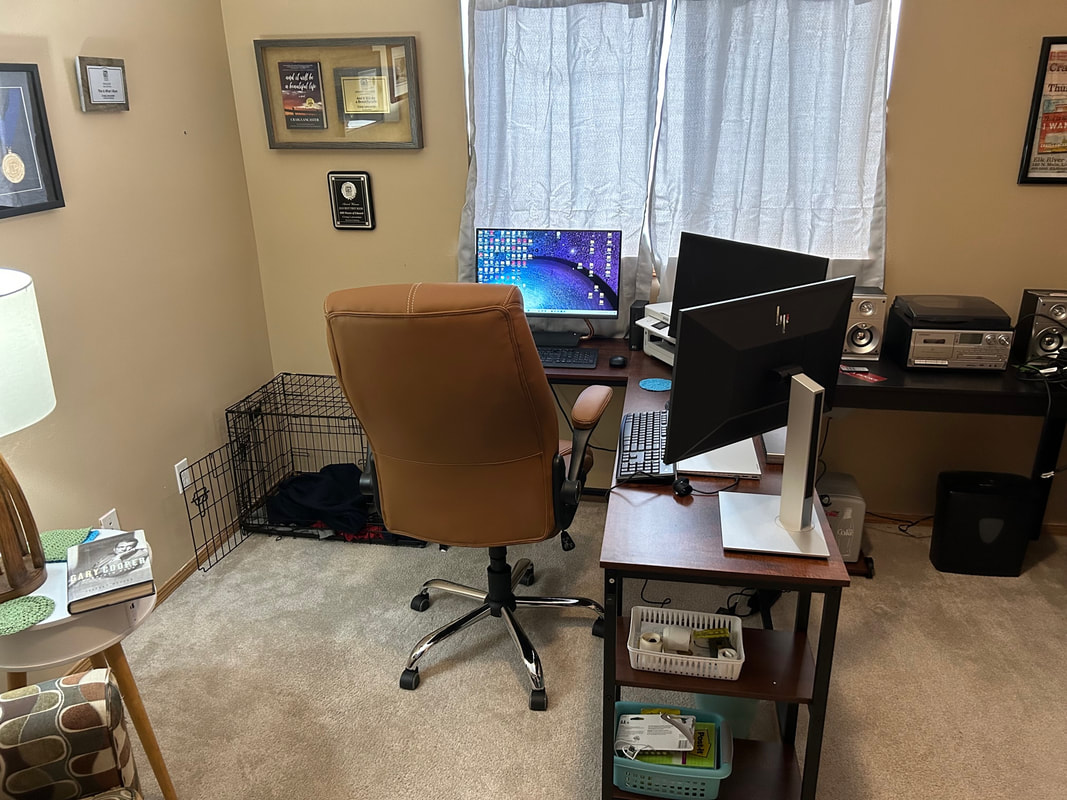 My ready-for-a-new-job office, starting from the left bottom corner: reading nook, Fretless' kennel, writing space on the short side of the L-shaped desk, work station on the long side, stereo set. Out of the frame: book library and vinyl library. There's a drink fridge there under the left speaker. A comfortable office is an efficient office. I started working in a way that supports me when I was 18 years old, which means I've been at it for a long, long time. Most of that work has tied into a life of letters: I was a newspaper reporter before I was an editor, then I was a newspaper editor and a novelist, then I was a novelist and a freelance editor/graphic designer, then I was a novelist, freelance editor/graphic designer and pipeline inspection specialist (the latter being the wild card in my working life), then I was a digital journalist, a novelist, a freelance editor/graphic designer and a pipeline inspection specialist, then I dropped that last bit through no choice of my own.
As of today, I am an analyst/content specialist with a data research group that advises financial services on how to evolve digitally. And a novelist. And a freelance editor/graphic designer (although I'll be much choosier about my projects now). This new job, which I'm entirely stoked to begin, came about in a way that's reminiscent of how I've always found the most sustaining work I've done: a connection, an unforeseen opportunity, a perhaps surprising love of the work, and away we go. I've gotten to know folks at my new job over a series of years, working with them on a freelance basis first and now as a full-timer. Job changes, by their nature, can be stressful and uncertain. The way this came together mitigates some of that. I feel fortunate. And I'm just entirely grateful to have the opportunity, at this juncture of my life, to plant myself in something new and learn new skills while also applying the old ones in new ways. In the broad view, what I've always done is tell stories (pipelining, perhaps, notwithstanding, although have you met Max Wendt?). Here I go again. So, before I go off on a burst of happiness, I should do this: In the interest of consistency and intellectual rigor, I must adhere to my basic sense that happiness, as an emotional state of being, is highly overrated. It's too reliant on current circumstance to be trustworthy, and the factors that spur it—good news, fortuitous coincidences, pure serendipity, and the like—are too transient to be relied upon. My aim in saying this isn't to knock happiness—if you have it, brother or sister, be thankful for it and keep it as long as you're able—so much as it is to cast a vote for its more durable cousin, fulfillment. If you're fulfilled in where you are, whom you're with, what you're doing, where you're headed, you have something to hold tight to when the transience of happiness is with you and when it's against you. That's my theory, anyway. That said, I'm pretty (burbly-happy curse word) happy these days. Let me count the reasons ... 1. One night in Big SkyI'm just back from Big Sky, about three hours from where I live. The board of the Big Sky Community Library chose And It Will Be a Beautiful Life as the community read (One Book Big Sky) for the fall. Tuesday night was sort of the capstone of the event. I drove out, had a wonderful chat with folks who read the book, spent the night, and came home. It was a soul restorer in all the best ways. When writers and writers gather, it can be a lovely thing (see below), but it can also be a release of the pent-up frustration that only writers know and thus are in position to help each other through. When readers and writers gather, it's straight-up love. How lucky was I to spend an evening with a bunch of people who read my book, read it closely, had such interesting things to say about it, and wanted to come talk with me? The luckiest. No doubt about it. I rode those good feelings all the way home. The drive from Big Sky to Bozeman is one of the most visually arresting things you can see anywhere in these United States, so there's that, and believe me, I drank it in (figuratively). I made stops at libraries in Bozeman, Livingston, Big Timber, and Columbus, planting seeds for more days and nights like the one I'd just enjoyed. Here's hoping. 2. The blessings of good friends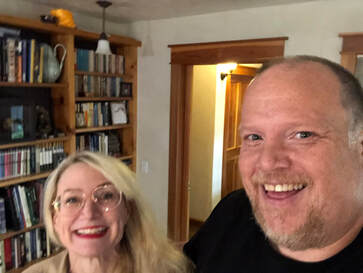 With AMERICAN ZION author Betsy Gaines Quammen. With AMERICAN ZION author Betsy Gaines Quammen. I think I'm only just now getting my considerable arms around how emotionally bereft the pandemic has left me (and so many other people, judging from what I'm reading and what I'm hearing). Honestly, I thought being chased inside and away from gatherings was a small blessing amid a horrible event, but it wasn't that at all. Now that I can see and meet the people I want to see and meet—while still being careful, of course—I'm realizing how much I craved it. Just in these past few weeks, I've gotten to hang in Butte, Missoula (thank you, Gwen Florio and Malcolm Brooks), Livingston (thank you, Amy Zanoni and Maggie Anderson), Bozeman (thank you, Betsy Gaines Quammen and Kryssa Marie Bowman), and Big Sky. I've had the fellowship of brilliant writers and thinkers, genuinely good people, and people who lovingly tend to the cultural life writ large. Man. I've needed that so much. So much. Happy? Yeah, I'm happy. But grateful most of all. 3. The work is going well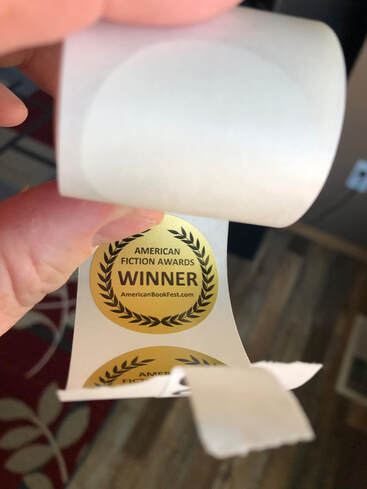 Winning an American Fiction Award was a lovely bit of news to receive. Winning an American Fiction Award was a lovely bit of news to receive. OK, look, here's where I keep it honest: If my publisher had said, sorry, kid, but your manuscript stinks and I'd received a lot of hate mail and my dog was snubbing me, would I be Mr. Happy? I would not. This, of course, underscores my point about fulfillment vs. happiness. I work to a standard I set so I can know I've done my best regardless of what a gatekeeper says (or, at least, so I'll have the gumption to try again if I find the door closed). I try to approach the world with an open heart because I believe that's how we get past at least some of our divisions. I engage with my dog so he knows I'm his, and he's mine. That's fulfillment. The happiness of it comes and goes. But I can't deny that I'm really, really enjoying every side of the work right now: The creation of it, when it's just me and an idea and the challenge of getting from here to there. The production of it, where I interact with the publisher I wanted to be with and who wants my work on his list. The carrying it to readers and interacting with them, which can be such an incredible validation of the work put in. The awards, both realized and potential (talk about transience). I'm as energized for all of it, the whole arc, as I've ever been. In Missoula, while waiting to eat lunch, I happened upon a meeting with a well-regarded poet and fiction writer and a genuinely good human. I don't know him well, but I like him, and even so, in the worst of my do-I-want-this-anymore crisis a few years ago, I deleted him (and a whole lot of other writers) from my social contacts, in a clumsy, flailing attempt at ridding myself of reminders of an endeavor I wasn't sure I wanted anymore. So there I was in Missoula, nonexistent hat in hand, apologizing for something I'm sure he didn't even notice, telling him I was in a dark place. He was kind and compassionate, as I expected he would be. I still appreciate the grace. I hope, the next time I'm on the other side of that conversation, I extend it to someone who needs it. I'd like to think I've learned something. Certainly, I appreciate that the want-to came back to me, and I'm going to nurture it as much as I can. But what happens when rejection arrives (as it surely will), or awards don't (ditto)? I don't know. I'll try to remember now and then and remind myself that I can be in both places. Just not at the same time. 3b. That was a lot. Here's an anecdote.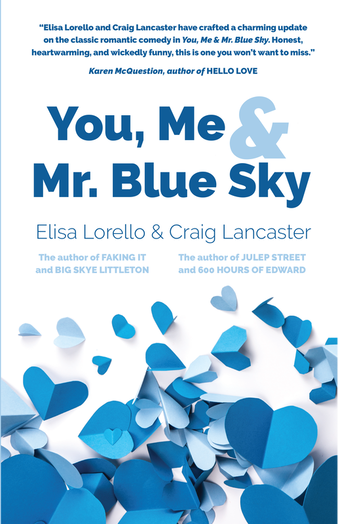 So I'm driving home from Big Sky and I'm talking on the phone—hands-free—with Elisa and I'm saying much of what I said above, only differently, and I'm telling her how energized I am, and I'm hearing how energized she is, and we come around to You, Me & Mr. Blue Sky. It's the novel—a romantic comedy that goes deeper, as Elisa's work does—she and I wrote together in 2018 and 2019. We released it ourselves ... and pretty much let it flop around out there. Our crises of confidence coincided. Those were hard, broken days. We had no energy for much of anything, and certainly not for getting out and trying to introduce a book to the world. We were too adrift in our personal lives to have the fire for the professional. Frankly, there were times I wasn't sure we'd make it. But we did, and we have, and we're going to. Elisa is back, too, and she said, you know what, we should put a new jacket on that old novel we never really got behind. Freshen it up. It's a story of brightness and hope, and it has this dreary cover that doesn't fit it. Let's give it some love. OK, she didn't say that exactly, but that was the gist. And here it is, dressed to meet the readers we hoped it would meet. 4. Health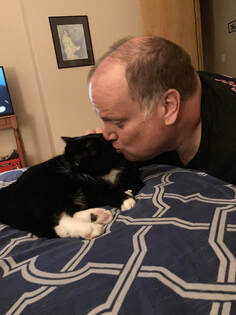 Elisa didn't join me in Big Sky because our cat, Spatz, has been ailing. The most recent health issue was one that had a small sliver of hope for resolution and a rather wide, grim likelihood in terms of what we'd have to do. I had an appointment I had to keep, and Elisa decided to stay behind and tend to our girl. And our girl, not for the first time, has proved resilient. Her issue has resolved itself—or, at the very least, has recessed into a place where she's her old self again for however long that lasts. She was a surprise when she came into our lives, and we've resolved to enjoy her for as long as we have her. That horizon, delightfully, has widened. We're thrilled. As Elisa is given to saying, she's our Rushmore, Max. 9/5/2022 0 Comments Finding the Wind AgainFrom time to time, on no fixed schedule, I drop a post into Facebook that starts like this: A little [whatever day it is] craft talk, if you'll indulge me ... I then hold forth on whatever's in my head, fixating on various aspects of the writing life (structure, pacing, idea management, etc.). I'm nobody's paragon of craft discipline, that much is certain. With regard to art, I am, for better or worse, a do-it type rather than a talk-about-it type. And because I didn't come from the academy or any kind of writing program—unless you count the immersive education of journalism—I'm not really comfortable with the conversations anyway. They too quickly expose the gaps I've papered over with intuition and practice. But I do have my moments. This morning brought one of them. I talked about how an idea I got charged up about a few weeks ago stalled out on me fewer than 20,000 words in ... and how I resuscitated it. Let's go deeper ... The idea is the thing Here's how it works for me, with the acknowledgment that everything herein has a disclaimer of your mileage may vary:
The idea that recently stalled on me had a fairly quick gestation. I'd say within a couple of weeks of thinking about it a lot, I decided to start writing (having a deadline was no small factor, I'd reckon). The decision to write is the crucial one, because that locks me into a commitment I'm not quick to make (my output over the past 14 years notwithstanding). One of my favorite quotes comes from Stephen King, who likened the writing of a novel to sailing a bathtub across the ocean. The decision to start writing puts me in the bathtub, and between you and me, I'd rather be on the couch. Experience, in my, uh, experience, is a double-edged sword. Writing a novel is much harder now than it was when I wrote the first one. Harder mentally, harder emotionally, harder physically (not that I'm unloading shipping vessels here or anything, but yer boy is older than he used to be, and things like eyes and fingers and butt cheeks aren't as hardy as they once were). All of that difficulty is offset, somewhat, by a greater ability to differentiate between a garden-variety idea and one that has the legs (or sea legs, if we're to stick to the sailing metaphor) to get from here to there. The stall-outs still happen, though. Sometimes I'm able to salvage them into a short story. Sometimes they just sit forevermore, dead husks taking up space on my hard drive. So there's that. When I sit down to work, I do have more confidence now that I'll be able to cross the ocean in my bathtub than I did years earlier on other projects. I don't have a guarantee—because of how I work, which some writers call pantsing, I'm never entirely sure where I'm headed—but I have the experience of seeing these ideas through, which grants me some confidence that I'll reach the other shore. But still: Bathtub. Ocean. And sometimes the wind leaves those sails without much warning. The stalling out I discovered I was adrift at about the 17,000-word mark. On the face of it, that's not a good sign. At that point, you're barely coming out of the early part of a novel-length work into the murky middle, where you have every right to expect that you'll feel lost (particularly if you're a pantser) while you're drafting the thing. I was scared—all that work, jeopardized—but not panicked. I set my work down and I made myself quiet. Over the next couple of weeks, I considered many things:
These thoughts began competing with each other, to the point that a haze formed and settled on my head and blocked my vision. In response to that, I got quieter. I focused harder. I listened more intently to what my inner assessments were trying to tell me. And then the haze lifted. Back in the bathtub Over the past four or five days, I've revisited the manuscript in progress. I've reread every word, from number one to number 17,751. I've recast many of them. And I've come to a few conclusions:
So onward we go. The sails are up. The knots are tightened. I might run the Jolly Roger up the mast, just to be a badass about it. In the meantime, there's a lot of open water ahead, but I have faith that the shore waits for me out there somewhere. 8/5/2022 0 Comments Great Falls, AdequatelyCome October 1st, it will be six years of marriage and about seven and a half years of togetherness for Elisa and me, and let me tell you: That's long enough that most of the stories have been told, mine to her and hers to me. We scooted away for an overnight trip to Great Falls this week. I had an event at Cassiopeia Books and an overdue acquaintance to make with owner Millie Whalen, and it was nice that Elisa and I could get away, just the two of us, for a little while. On the trip home, one of those untold stories spilled out ... Great Falls is where a lot of my family lore resides—my father, born in Conrad, grew up around there, and he and my mother married there long before I showed up—but it's not somewhere I often go. In nearly sixteen years of living in Montana, I've been only a handful of times, far less often than I've been to Missoula or Bozeman or Livingston or Helena or, heck, Miles City or Glendive. But in 1992, I almost moved there. That's the story that had gone untold. Now, when I say "almost," some qualifiers are in order. I wanted to move to Great Falls (or thought I did). The sports editor at the Great Falls Tribune at the time, a wonderful guy named George Geise, wanted me to move to Great Falls. The man who could make it happen, a senior-level editor at the paper I'd just as soon not name (but whose name I've never forgotten), made it clear I wouldn't be welcome there. The reason: I didn't have a college degree, and he didn't think I was qualified for the job without one. (I still don't have a sheepskin, but that's another story.) Now, let's be clear: This guy was flat-out wrong. I could handle the job I'd applied for (sports copy editor/page designer). I was handling it at a paper of similar size in Texarkana, Texas, and I would go on to handle it at progressively larger, more prestigious papers. I would, in time, become well-decorated and well-traveled. I would lead workshops in editing. I would direct a large sports department at a large West Coast newspaper. I would ... but I hadn't yet. Not in 1992. Then, I was a 22-year-old kid with some talent and, in fairness to the Executive Who Shall Not Be Named, some cockiness that was a bit out of proportion to the skills I'd honed to that point. And that imbalance, I think, would have been a perfectly valid reason for him to say, "Sorry, kid, not going to happen here." But that's not what he said. He fixated on the degree I didn't have. I didn't get the job. George Geise was disappointed. So was I. There was personal history to unearth in Great Falls, and I was already well in love with Montana, an affair that goes on and on. I thought I was missing out on something important. So, stuck for a while longer at a job in Texarkana I no longer wanted*, I made a resolution, one that has stuck for 30 years: No way was a guy like that going to be right about me. I made sure of it. *—In Texarkana, the single most appalling moment of my journalism career, now more than three decades old, happened. When Magic Johnson rejoined the NBA after his HIV-positive diagnosis, I played the story big on the front page of the sports section (as did just about every paper in America). The next day, a copy of the page was in my mailbox, the story circled in red pen, along with a note from an executive at the paper: "Magic Johnson is an immoral HIV carrier, and none of our readers care about him." I should have quit on the spot. It's to my eternal chagrin that I did not. I did, however, start looking for a new job immediately. 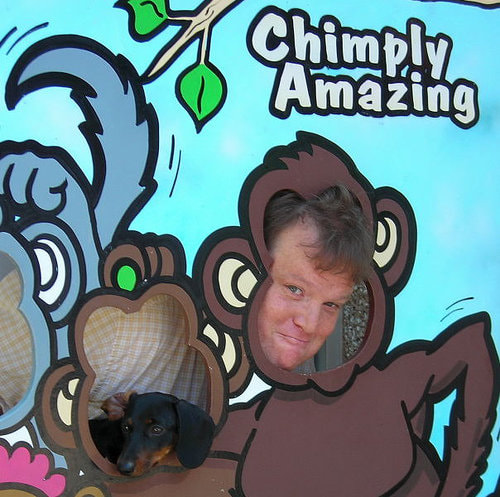 Me with Zula (RIP), clowning around in Great Falls in 2007. Me with Zula (RIP), clowning around in Great Falls in 2007. Now ... Did I miss out on something by not finding my way to Great Falls in 1992? Well, yes. Something. But not everything, and not the most important things. I didn't make it to Montana and stick here until 2006, when I was 36. Within a couple of years, I was writing books, something I'd have not even attempted 14 years earlier. By the time I got here, I'd already dug into the personal history that was faintly compelling me in my early 20s. I'd found my grandfather and closed an open question. I'd begun to talk to my dad about his life and his memories, so I could find ways to get closer to him. In subsequent years, I'd help, in whatever meager way I could, to put ghosts to rest. The headstone pictured below on my grandmother's grave (in Great Falls) went in just 15-plus years ago, well after her death, as my father began to forgive her for the ways she'd wronged him, a thawing of feelings that came about because he and I started digging in the hard soil of his past. On some level, I'm just guessing, but I doubt any of that would have happened the way it did if I'd shown up in Great Falls at the callow age of 22 and burned through that job the way I burned through others during that time in my life. Montana might have been over and done with before I could have gotten to know her. I might have missed the best years I've enjoyed here. The very best years of my life, as it turns out.
So far, anyway. 7/17/2022 0 Comments On the Struggle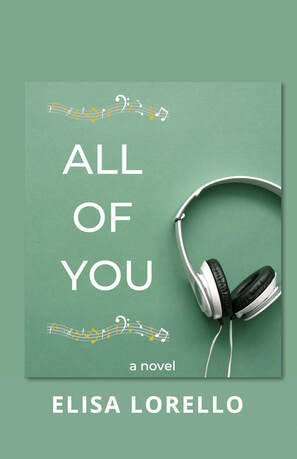 I just—and when I say just, I mean less than an hour ago—finished constructing and printing out the interior print file for Elisa's forthcoming novel, All of You. I'm proud for so many reasons: that she's written another banger, that she's making tangible progress toward getting it out there, that I am able to use a skill I've developed to help her. Elisa believes in this novel, and she's reached a juncture in her career where putting it out herself and realizing her own vision for it is of paramount importance to her. And that gets at why I'm most proud: A year ago, she wasn't sure she'd ever be here again. Three years ago, I wasn't sure I would be. Much of the joy of writing and publishing and connecting had been sucked out of it, for both of us, for similar and divergent reasons. And, listen, if you can't find the joy, there's not much reason to keep going. The difficulties are too numerous, the frustrations too pitched, the dead ends too abrupt in the best of circumstances. Joy, and its cousins purpose and determination, helps carry you through all of that. I won't speak to how Elisa lost joy and found it again; that's her story to tell in her way. But I can speak to my own journey ... Facebook is a scourge, mostly. But it's also a scourge with features that aren't easily replaceable through other means. I can't call up my nieces and nephews on the daily and ask what's going on their lives—I mean, I could, but they'd quickly tire of it, and I'm just not constituted to operate that way—but I can see every important turn on Facebook. I can be conversant about what they're doing. I can feel connected to them. Similarly, there's nothing quite like Facebook's Memories feature to remind you of the way things once were. Sometimes, it brings into sharp relief just how different your current circumstances are. Elisa and I get this a lot, especially this time of year, which synchs up with the first summer of our courtship—The Magical Summer of 2015, as we like to call it. And so we sit at the breakfast table, older, paunchier, scuffling harder to pay bills, not knowing when or where our next vacation will be, and we sigh contentedly at the memories of a time when royalties were flush, there were no jobs to go to, and we could just disappear without worrying where the next check was coming from. And we say "gee, wouldn't it be nice to experience that again?" and we agree that it would be, but we're not really thinking about how much richer life has become in other ways, lost as we are in the haze of memory. We're not thinking about the house we bought together, the pets we love, the history we're building. We're thinking about being financially carefree and unbound by anything other than our imaginations. They're pretty sweet, those memories ... If you've read the past several paragraphs and thought, OK, great, Craig, but that was a bunch of sentimental claptrap about life and leisure and I'm here for the struggle with art, let me say this: I find it impossible to separate the two. Those memories from 2015 beguile us, in part, because of what fell out from there: Love and marriage and commitment, yes, but also struggle. We both wrote and published books we loved and believed in, same as we had before, only those subsequent books weren't commercially successful in the same way their predecessors had been. We fought against ourselves to recapture what we thought we'd lost, not really having any idea what it was or why it had seemingly gone sour. We got dumped by our publisher, and while it would be nice to be above it, to greet such news with an attitude of "their loss," the simple fact is that the losses felt very much like ours. It felt like rejection, because it was rejection. It hurt because we are humans, and we bleed when we're cut.
However ... It's important to know that, even as you build yourself up as special, you're not. Rejection isn't your burden alone; everybody grapples with it. A change in trajectory isn't singular failure that's on you; that's life and what happens sometimes when you have the audacity to live it. It took a while to come out of that depressive trough. It took a while to find a new footing. It took a while to want to get in there and slug it out again. For me, the breakthrough came when I realized that my happiest place was inside the work, where it was just me and the stories I'm trying to tell, where the measure of progress is keeping faith with what I'm attempting to do by showing up, every day, and doing a little bit more to realize it. When I rediscovered that, the rest began falling in. The publishing partner with whom I want to bring these stories out, who believes in the work the same way I do. The reconnection with a sense of fulfillment (not necessarily happiness, which is more transient and thus, honestly, less valuable to me). Exterior validations of the work. But always, always, it's the work. I see that in Elisa now, the spark she has rediscovered with this new book. She's fully into her own joyousness, and you can take it from someone who's seen this from her before and worried when it went away for a while: Look out. She's got this. 6/25/2022 2 Comments The Road Called, and We AnsweredHere we are, nearly halfway through 2022, and I've only just caught up to reconciling something that happened in late 2021. (I suspect this is either because I'm slow on the uptake or because I just hadn't taken the time to lean into my feelings and sort them out. Maybe even both!) At any rate, at the end of the year, the company for which I'd done some occasional pipeline inspection work for the past several years folded up its U.S. operations. Just like that, I was out of a gig. First, the important stuff: It wasn't more than a trickle of an income stream, so it's not like I was jobless or under the threat of imminent financial disaster. It wasn't and never had been a career, so I wasn't grappling with the loss of self. The point being, it wasn't a massive blow to the bottom line or self-identity. And yet ... It was a blow, undeniably. I felt the absence, and I felt a little unmoored by the fact that I didn't have any work trips coming up. I found myself thinking inordinately about the places I would commonly go on these work trips—Buffalo, N.Y., and Chelsea, Mich., and Michigan's Upper Peninsula, and the far reaches of Minnesota and Wisconsin. My thoughts would drift to Minot, N.D., where I'd gone for my first such job, way back in 2015. And then it occurred to me: What I'm really missing here is that liberating sense of being gone. I'm 52 years old, and I've never lost that urge toward motion, travel, getting in the car and going, any direction will do. I like hotels and corner restaurants. I like people watching in places where I don't know anyone. I like seeing what's over the next horizon, even if I've seen it before. By now, I surely most know that it's incurable. So I told my understanding wife that I needed to go, and I packed up the dog and a week's worth of clothes, and I went. The idea was to go to Minot and, from there, launch revisits of a few pipeline routes that emanate from there. The Minot part was easy enough. The rest, though, went against my expectations. Here's a glimpse (material stolen from a subsequent Facebook post): 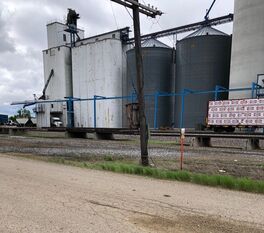 See the orange post there? I tracked my first pipeline tool from that site (smack in Berthold, N.D.) back in 2015. See the orange post there? I tracked my first pipeline tool from that site (smack in Berthold, N.D.) back in 2015. I haven't missed the pipeline work—which, you know, is work—nearly as much as I've missed the travel and the solitude. The solitude most of all. I don't think happiness exists in a fixed place; it is, instead, what you make of it and where. But if I'm wrong about that and happiness really is out there in a place you can pin on a map, then I'm fairly certain that place is on a tertiary road in some lonely precinct where no one goes on vacation. I came here thinking I'd ride the full length of a few lines, stopping at every checkpoint and taking them in, and I was wrong about that. I don't need that much immersion. I just needed to be out. Away. Gone. Just for a few hours at a time. God, how I loved it. God, how I've missed it. On our last full day in North Dakota, Fretless and I rode a small portion of an 85-mile line that runs northwest from Berthold, N.D., to the Canadian border. It was, simultaneously, a total kick of nostalgia and an entirely new experience. The only time I did this line for real occurred in the deepest of winter, 2017. It was bitterly cold that night. The snow was in drifts. The wind blew the snow around in ways that would mess with your perception of things. On those dirt roads, some of them just two-track, you'd see a pile of snow and you'd stop the car and get out, the wind biting your face, and you'd walk it first to make sure you wouldn't get stuck. You don't want to get stuck, believe me. It's happened to me, more than once. It's bad. I once waited for seven hours in Wisconsin, my work vehicle sunk to its axles in a blizzard, for a tractor to come and yank me out. You don't want this. See the pipeline marker in the photo above. To do my job, I'd have to wade through snow, sometimes chest-deep, and put my sensory equipment there to record the tool passing by, deep underground. Then, after a passage, I'd have to wade back out and get the equipment, then try to swim back to the vehicle, hoping I didn't get hung up alone out there. Meanwhile, the tool was zipping along to the next checkpoint at about 7 mph, which is really hauling ass. It was desolately lonely and dark and cold and scary. I loved it so much. The line parallels railroad tracks (see the map above), which cross the road at uncontrolled intersections. In the night and the cold and the dark, snow flying sideways and obscuring your vision, you'd have to be careful, hanging out in those places. When Fretless and I went out, though, it was different. Warm and clear. Sunny. No snow. No drifts. More red-winged blackbirds than I could count, although not one of them stood still long enough for me to get a picture. Farmland was verdant with moisture, not gray and white and foreboding like in my memories. That night I ran the line for real, in March 2017, we finished at the border and the snow was coming down in massive clumps. I drove to my waiting hotel in Williston, more than 100 miles away, unable to see a damn thing, holding my phone in front of me and using the GPS program to keep my truck on the road, or where the road was supposed to be. I didn't tell my wife about that until a day later, when I was safely home. I don't miss that kind of stuff. A little more than a week ago, when I'd had enough, I asked Fretless, in the backseat, if he wanted to go back to the hotel. He wagged his tail agreeably. I cracked the windows, letting in some fresh air, and we got the hell out of there. It was glorious. Every little bit of it. I had to work the evening of getaway day, and long gone are the days when I can drive for eight hours and work for another eight, so we stayed that night in Sidney, Montana, another dot on the map rich with memories. Again, borrowing from Facebook: 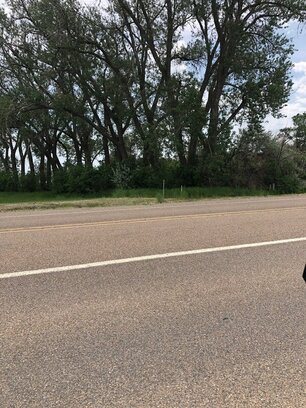 See the windbreak there? That's on the southern edge of Fairview, Montana, a little town that straddles the Montana-North Dakota line. In late summer 1981, when my dad was in the midst of moving his drilling rig from one town to another, the right-front tire on his International Harvester Paystar 5000 blew out and he, with much effort, brought it to a stop right there. I have a clear memory of this because I was in the passenger seat, so it was my side of the truck that dipped precipitously, as if we were going to pitch over on our side. I also well remember it because it was a classic bad news-good news scenario. Bad for obvious reasons, and for these reasons: Dad's hired hands, who'd ordinarily be following him, had gone out ahead of us by a couple of hours. We were alone. Good because there's a house right there, and a small town just ahead. Easy to make a call, even in 1981, and get some help dispatched. Now, lemme ask you this: What do you suppose the percentage chance was that this boy, who lived at the time in Texas, 26 years later would marry a woman from tiny Fairview (population now 900, but much smaller then)? As it turned out, 100 percent. (We divorced seven years later, so it's less a fairy tale than an interesting coincidence. But still.) OK, let's move a dozen miles down the road to Sidney. That train engine, in Veterans Memorial Park, with Fretless offered for scale? I climbed all over that thing that summer. I was 11 years old, and that's pretty much the recreation that was available to me. The city fathers hadn't yet fenced it off, so I was free to clamber wherever I could get to. I also chewed illicit tobacco, given to me by my dad's helpers, who encouraged me to have all I wanted, knowing full well what would happen to me. Bastards. Anyway. Across the street, still standing but no longer operational, it seems, was the Park Place Motel. I lived that summer in one of the bottom-floor rooms, with dad and his wife. It was entirely too cozy, entirely too stifling, entirely too familiar. And yet, I'm thankful for the memories, which quite without my realizing it were becoming fodder and fuel. I've set stories in that park, and in those fields beyond it. With very little disguise (or even much of a name change), I've turned Fairview into a character all its own, the little town of Grandview in This Is What I Want.
It's all been a gift, every bit of it. I'm grateful, all the time. And I can't wait for the next trip ... 4/18/2022 0 Comments Who I Am. What I Do.**—If I'm doing it right, there's both overlap and freestanding territory. For years and years, I didn't do it right. Facebook, I've noted before, isn't good for much, but it's damn near essential for a few things: easy keeping up with far-flung friends and relatives, recipes, irritating others with your daily Wordle grid, cat memes, birthday greetings (the most heartwarming day of the year, every year), etc. Increasingly, I'm finding value in the stored-up daily memories, especially the things I don't remember writing or don't remember the impetus for writing. Today (April 18) served up this kick to the hippocampus: My newspaper career started in October 1988, when Jim Fuquay gave me a job as a part-time correspondent at the Fort Worth Star-Telegram. It ended in August 2013, when I left my job as night city editor at the Billings Gazette. In between, I worked at nine newspapers in six states. Some jobs I took for the adventure (Peninsula Clarion, Kenai, Alaska, age 21). Some I took for money (Dayton Daily News, 1994). I almost always regretted those, by the way. Some I took for escape (Anchorage Daily News, 1995, to get away from Dayton). Some I took because I knew they'd make me better (San Jose Mercury News, 1998). One I took to correct a mistake (San Jose Mercury News, 2000, after bouncing to both San Antonio and Olympia, Wash., earlier that year). Twice I accepted jobs and then backed out before I was due to report (particular apologies to the Lewiston (Maine) Sun Journal). I took different jobs for different reasons. Sometimes those reasons panned out and sometimes they didn't. But most of the time, what I was really looking for in a new job was some new version of me. I never found that. Not once. It feels good to finally admit this. Let's unpack this, shall we? Elisa and I were talking about this the other day, having reached an age at which there's plenty in the rearview to examine and second-guess and (we hope) plenty of road ahead to consider other pathways: If we had it to do again, would we make different career choices? What might we have done instead? Because those ponderings inevitably run up against the butterfly effect, we ended up in a predictable place: Nope. We're good. But it remains an interesting thought experiment, if only for the clarity you find about the choices you did make. I ran toward print journalism—and stayed there a good long time—because it made good use of my particular talents and because it was, in my narrow sense of the word, a daily adventure. Within the strictures of daily newspaper production—you have to gather the stories and stats and pictures, you have to edit the material, you have to design the pages upon which it all rests—were wide variables in what you dealt with daily. The news was always different. The pages began, every day, as blank canvases. I loved that. What I traded for that was significant, though: Friends in other lines of work made more money, enjoyed greater security and stability, had evenings and weekends free, etc. These are not insignificant things. Who I was and my stance with regard to work, especially in my 20s, are so entirely removed from who I am now that I have to strain to remember that guy. I know that his entire definition of self was wound up in being a journalist, that he went to bed thinking about it and woke up each morning with it on his mind, that he bounced up to the world with that shingle around his neck. I lived to work, and I sought out any chance I had to work extra hours, to get plum assignments, to make myself as close to indispensable as I could (an illusion, of course, but one I willingly bought in those years). It's what I didn't do that taunts me now. I didn't fall in love in those years; how could I, when the aggrandizement of Craig the Journalist was front and center among my priorities? I get at that idea in the Facebook memory above: In all my wandering around, looking for some new version of me, I carried my old self into each new situation (wherever you go, there you are). I didn't learn to play the guitar or take a judo class or write a novel. Until, you know, I wrote a novel. When I was trying to emerge from brokenness and impending divorce in 2014-15, I spent a lot of time with a counselor (highly recommended) and with my nose in reading material aimed at my mental/emotional state (e.g., King Warrior Magician Lover) and my soul (The Rag and Bone Shop of the Heart). I wanted to understand what was happening to me, why it had happened, the parts for which I had responsibility (many) and the parts I had to let go (also many). I also read a lot of shorter pieces, some with resonance and some without. Two that stick out, years after the fact, were written by Mark Manson. I recommend these highly, whatever your situation: Fuck Yes or No: "Since you’re now freeing up so much time and energy from people you’re not that into, and people who are not that into you, you now find yourself perpetually in interactions where people’s intentions are clear and enthusiastic. Sweet!" The Guide to Strong Relationship Boundaries: "People with poor boundaries typically come in two flavors: those who take too much responsibility for the emotions/actions of others and those who expect others to take too much responsibility for their own emotions/actions." I hear what you're saying. Craig, you're saying, this is great, but you're talking about personal relationships now, and you were talking about work, and I'm confused. No, no, I'm still talking about work. This is the point. In the extreme emotional duress of a divorce—a traumatic thing I do not recommend, unless, of course, it's the thing that will skirt an even bigger trauma—and with the help of a well-trained, compassionate human and the collected wisdom of learned thinkers, I began to unlock some problems I'd dragged into every area of my life: my interpersonal relationships and my relationship with work. This hard process of dredging up changed me. Better personal boundaries also meant better work boundaries. I'm no less good at what I do—in fact, I'd argue that I'm much, much better than I've ever been—but no longer am I defined entirely by a magazine spread that I've designed, or a report I've edited, or a chapter I've written. What I do is also who I am, but it's not the entirety of the picture. It was written mostly as a joke, but like any good joke, there's truth inside it. In the sidebar on this blog, I define myself this way: Craig Lancaster is an author, an editor, a publication designer, a layabout, a largely frustrated Dallas Mavericks fan, an eater of breakfast, a dreamer of dreams, a husband, a brother, a son, an uncle. And most of all, a man who values a T-shirt. I can live with that. 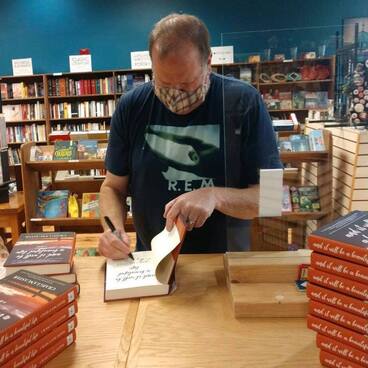 Signing copies at This House of Books in Billings. Signing copies at This House of Books in Billings. In some significant ways, what's happening now in the American workforce—this thing they're calling the Great Resignation—is a manifestation of an assertion of boundaries. We've been through a lot: social tumult, a deadly pandemic, a rebalancing and cross-pollination of work lives and home lives. People are reconsidering what they value, how they want to toil, whom they want to toil for, and what price they're willing to accept for those vast swaths of their finite lives. Good. It's healthy in the long run, even if it's upsetting to the status quo in the shorter term. The last time I moved—packed up my life and my car and my expectations--for a job was more than 20 years ago, when I left Olympia, Wash., to return to San Jose, a place I never should have left in the first place. I can't imagine doing it again, although one of the benefits of growing older is learning that one really shouldn't say never. My point is that although I plan to strap on the work boots for a good long time—I like to work, a fact that was clear even 30 years ago, if badly applied--where I am and who I am and how I'll share those parts of me need more than just a job. I need a multidimensional identity, too, and at last I have one. That's what I was missing in all those moves cited in the Facebook post above. The last time I recast how I define myself professionally occurred when I wrote and published that first book and I figured I could finally call myself a novelist instead of just a guy who wished he had one inside him that he could extract. That was nice, too, but it's not everything. Without the laying about and eating breakfast and doting on my nieces and nephews and being a son and a brother and worrying about the Dallas Mavericks and spinning through this life with my wife, in fact, it wouldn't mean much at all. |
About CraigCraig Lancaster is an author, an editor, a publication designer, a layabout, a largely frustrated Dallas Mavericks fan, an eater of breakfast, a dreamer of dreams, a husband, a brother, a son, an uncle. And most of all, a man who values a T-shirt. Archives
July 2024
By categoryAll 600 Hours Of Edward And It Will Be A Beautiful Life Awards Books Bookstores Community Connection Craft Craig Reads The Classics Dreaming Northward Education Edward Adrift Family Geography History Libraries Memory Montana NaNoWriMo Northward Dreams People Plays Poetry Public Policy Q&A Social Media Sports Stage Texas The Fallow Season Of Hugo Hunter The Summer Son This Is What I Want Time Travel Work Writers Writing Archives
July 2024
|
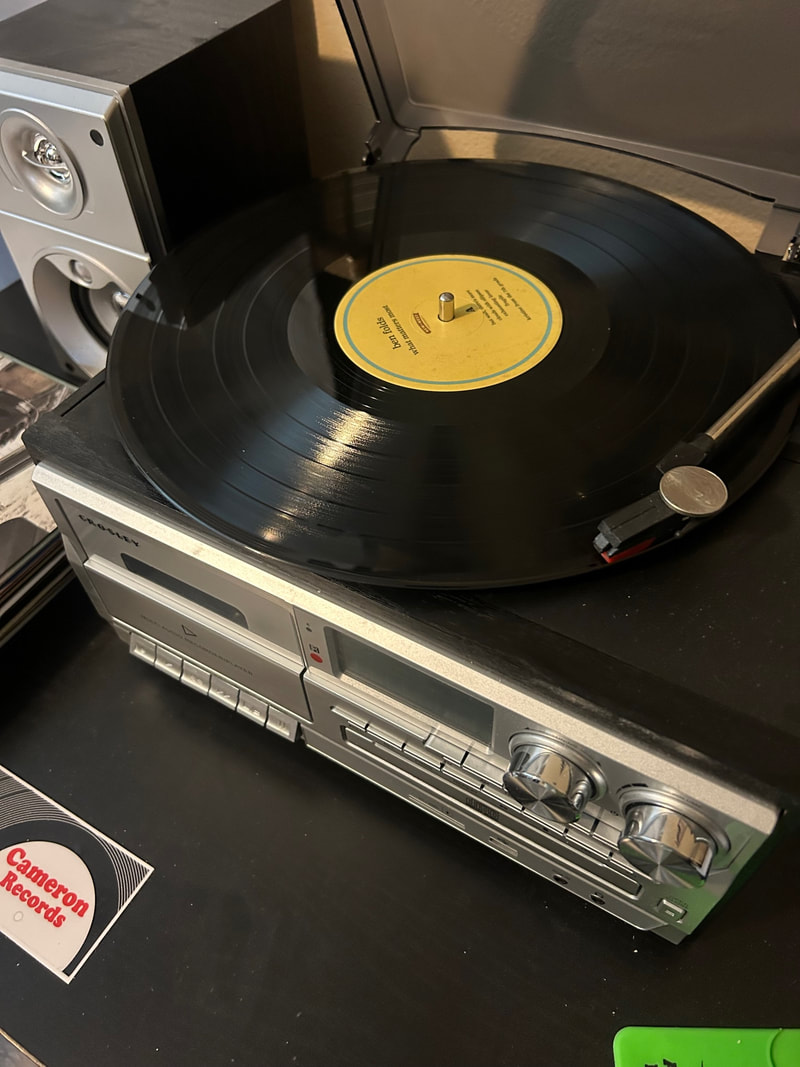
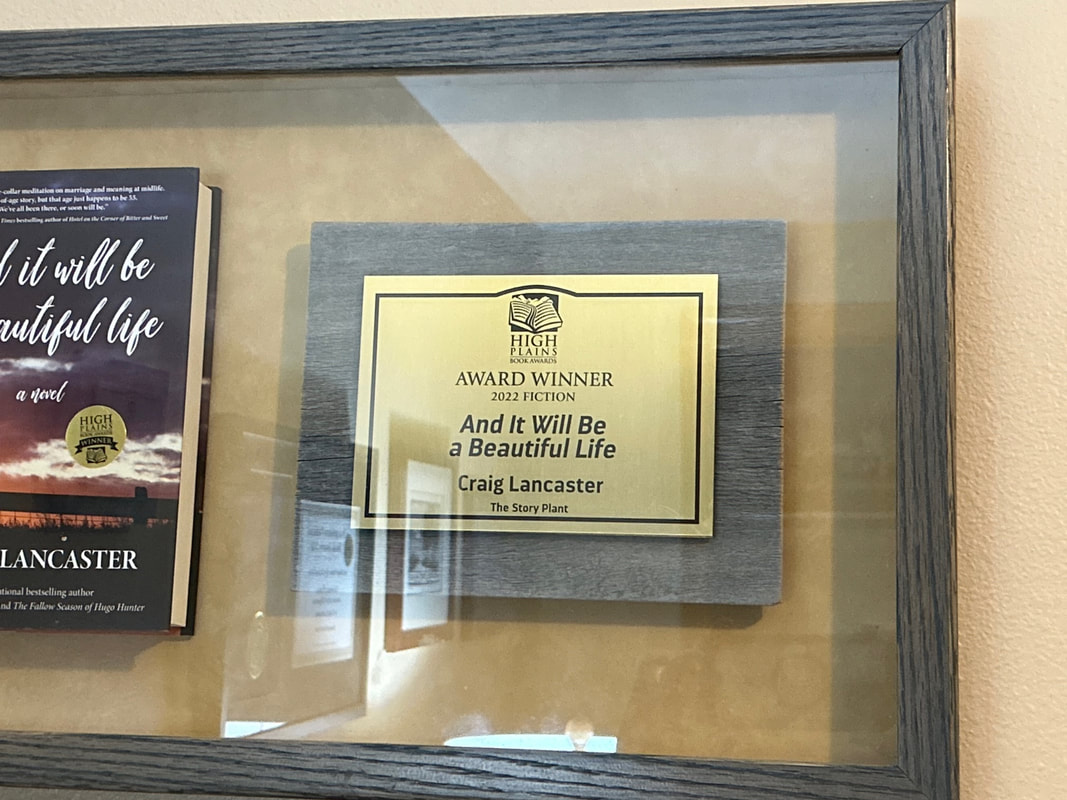
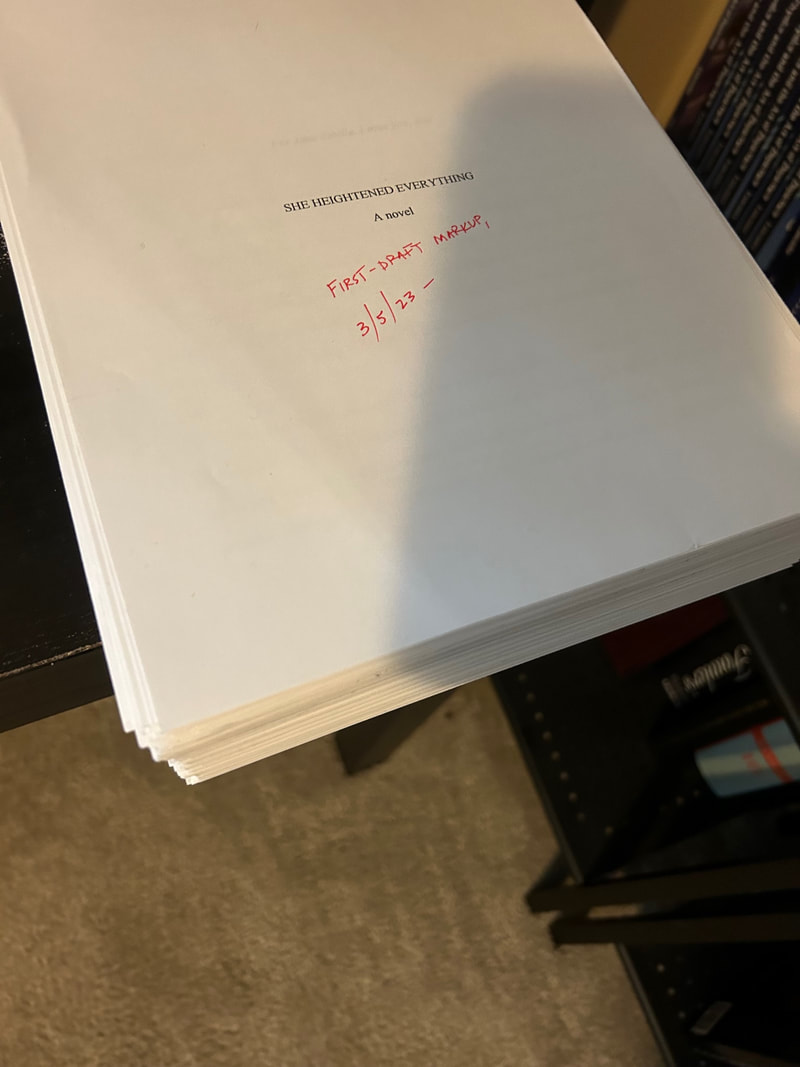
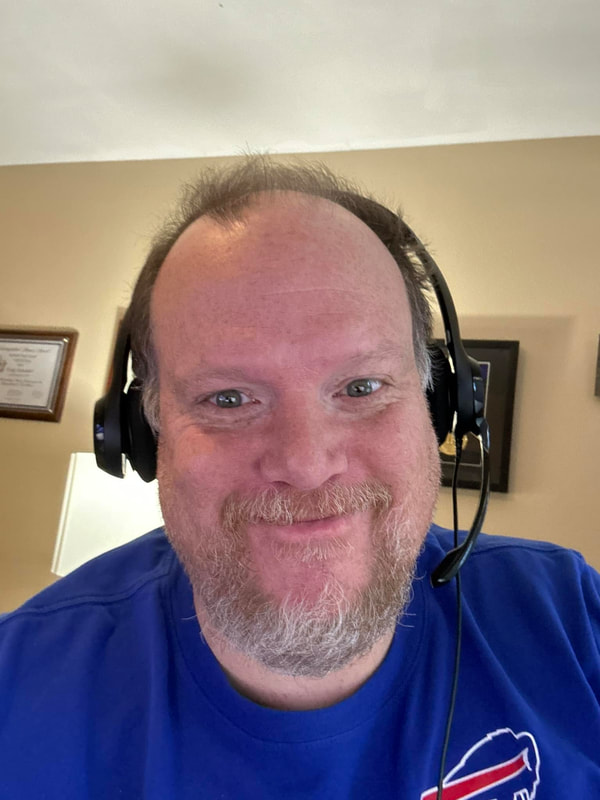
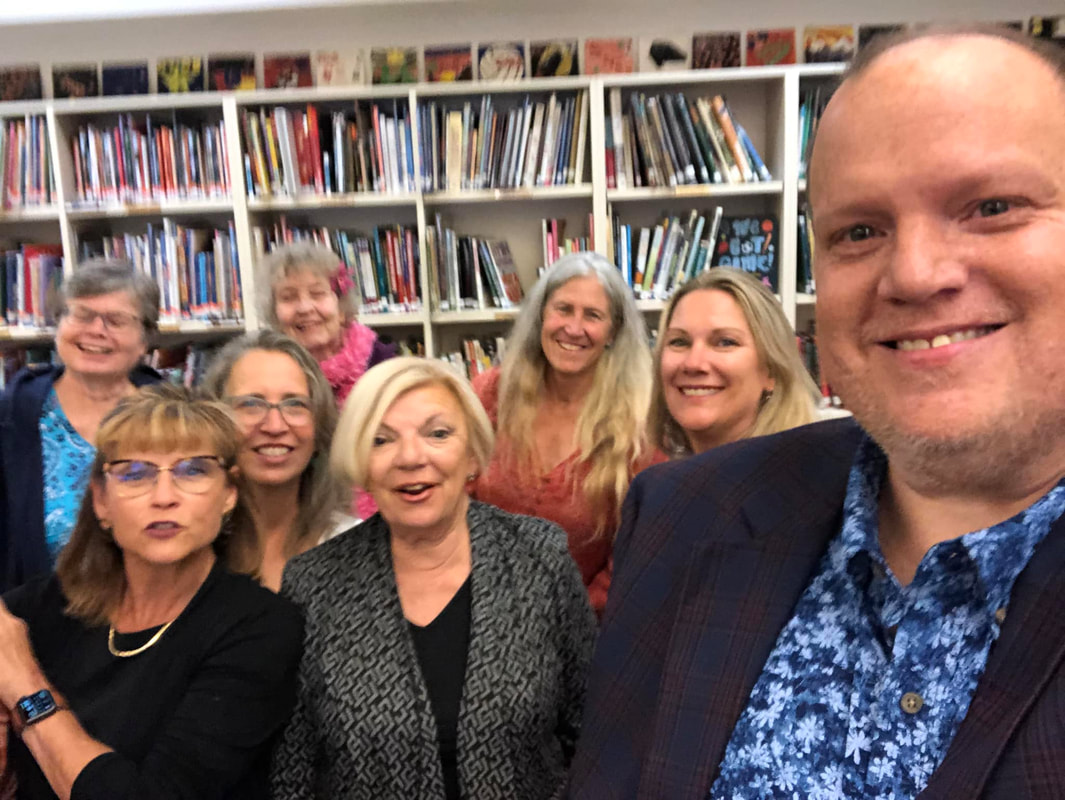
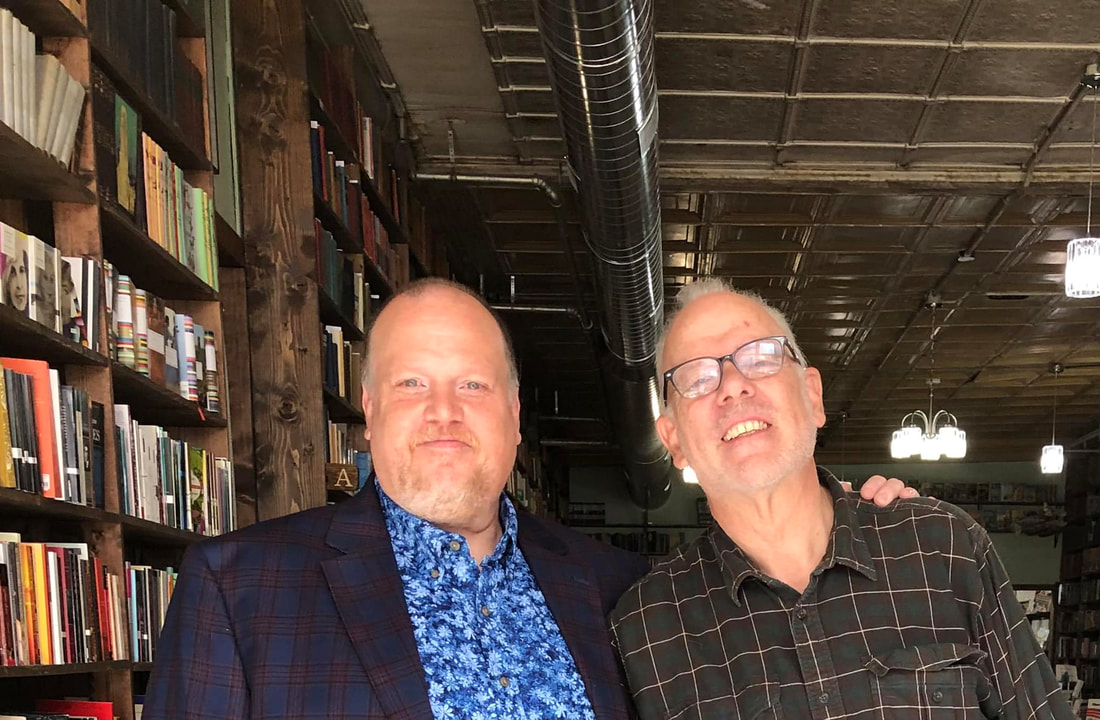

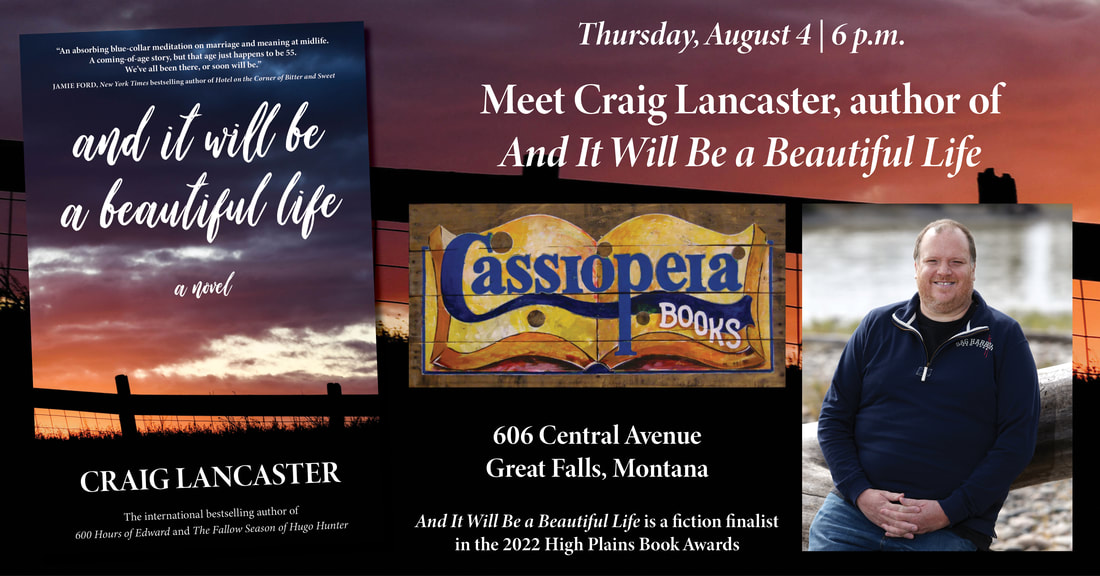
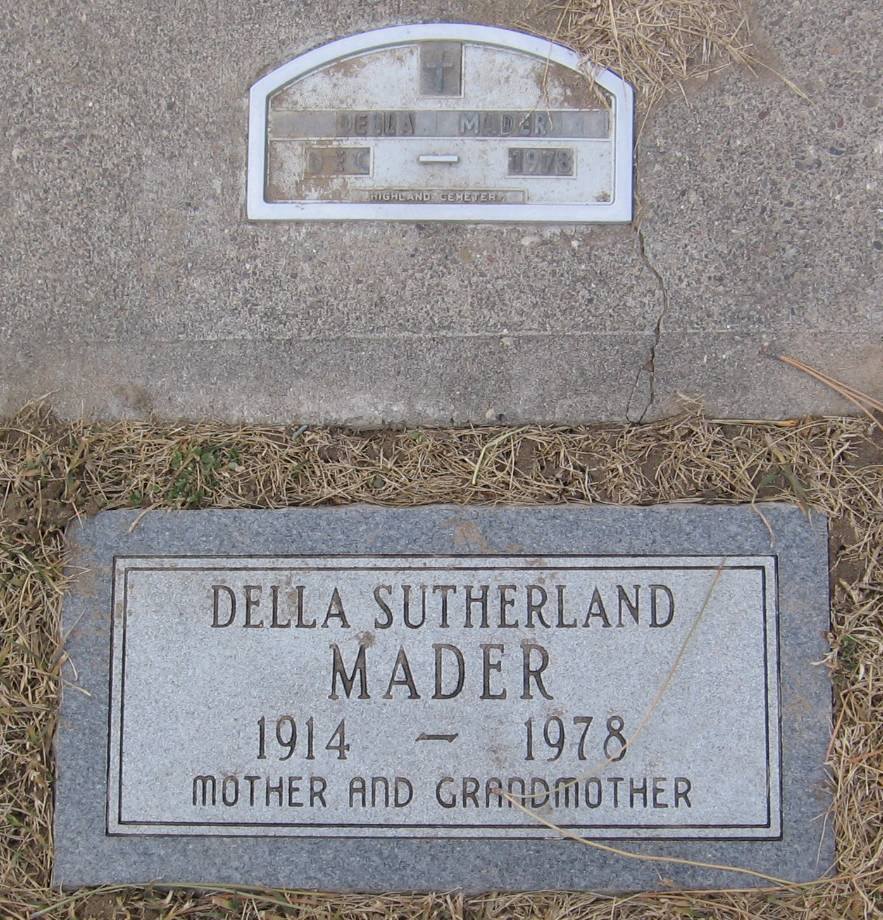
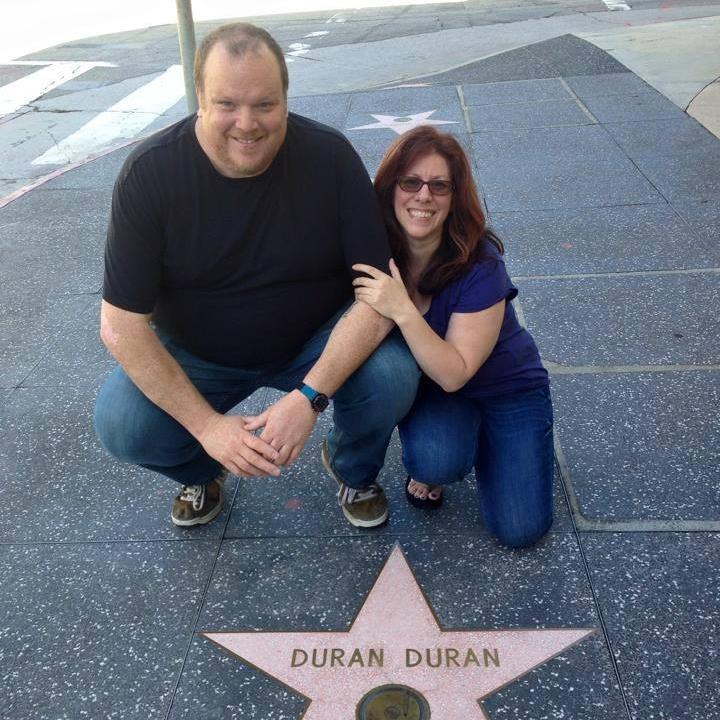
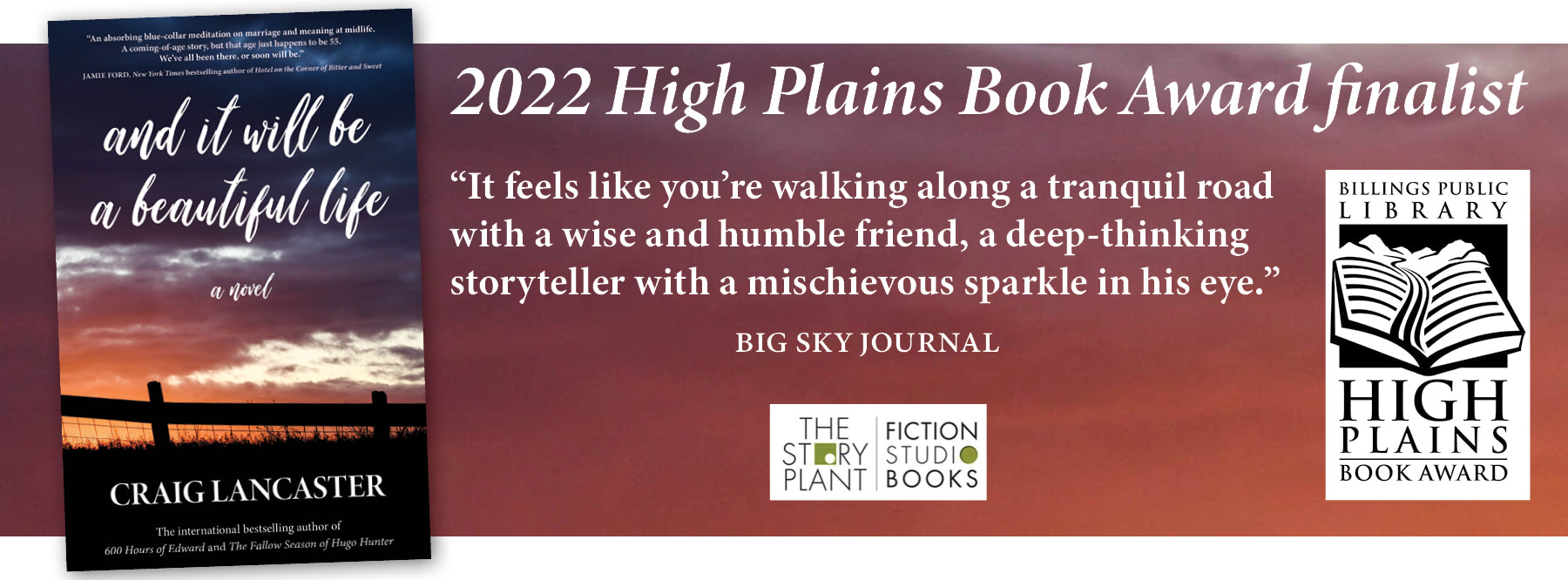
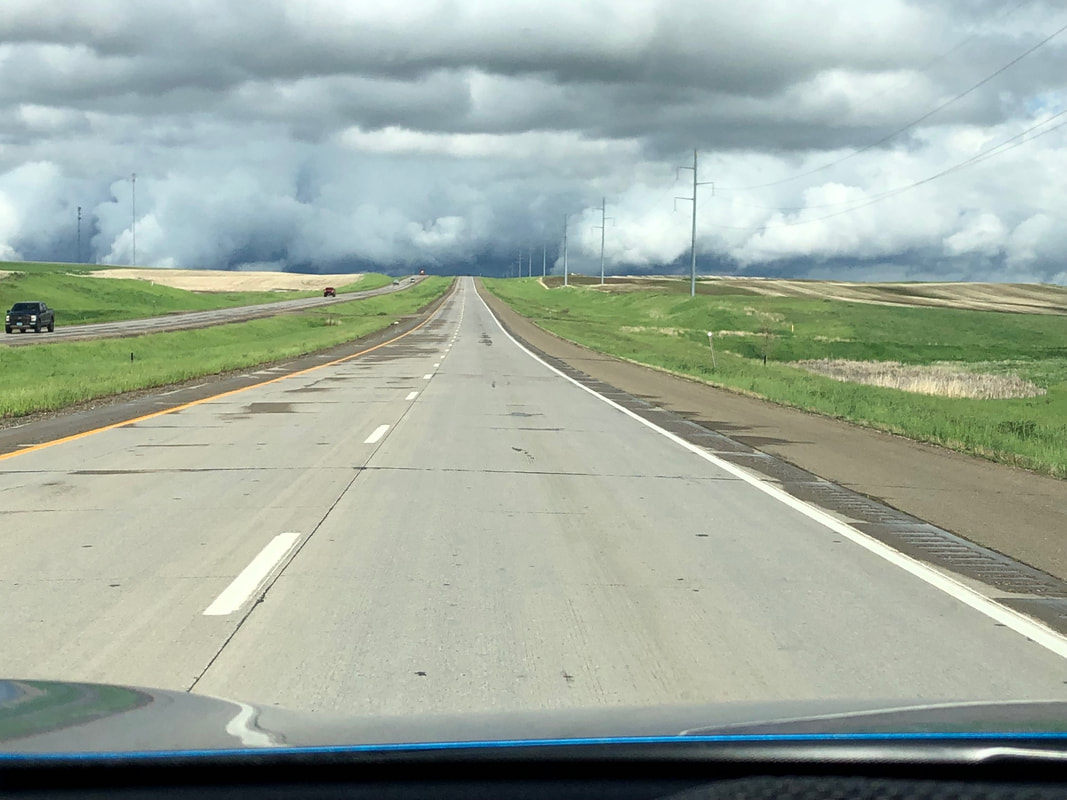
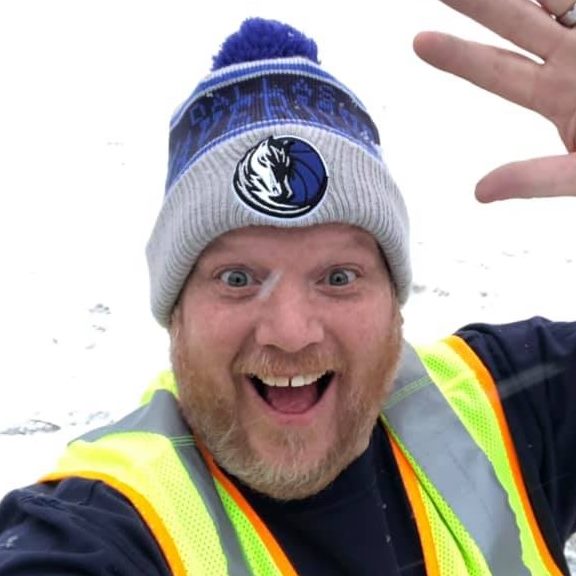
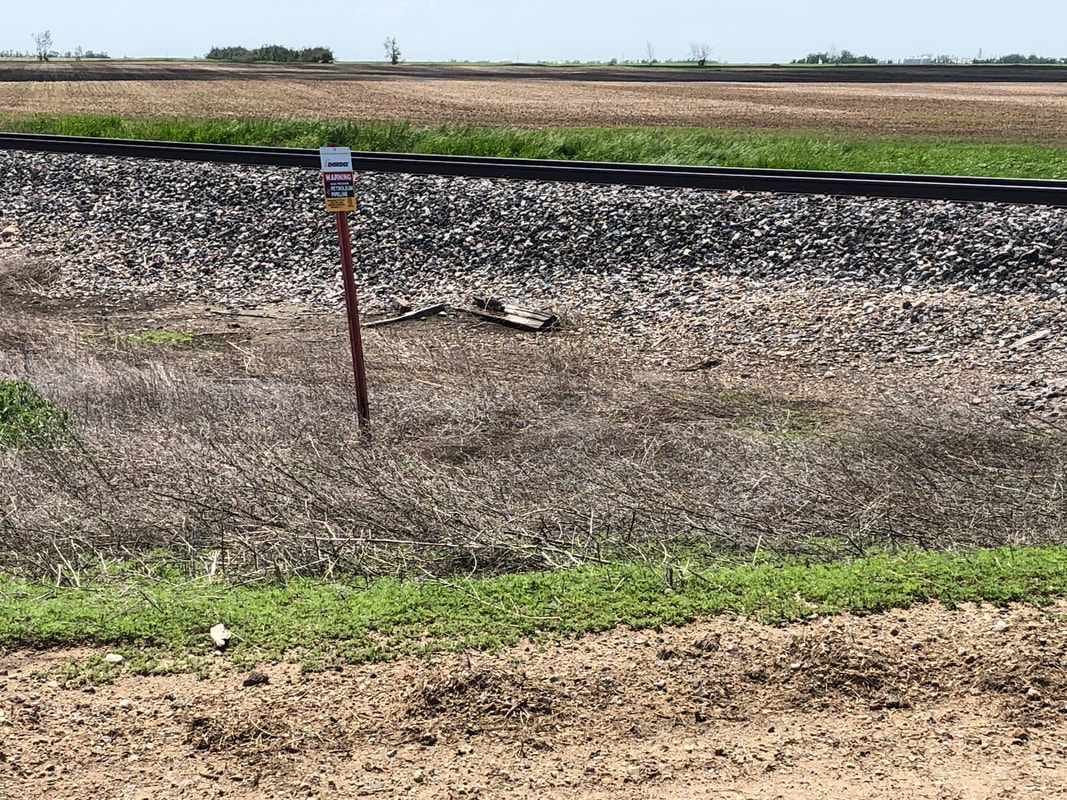
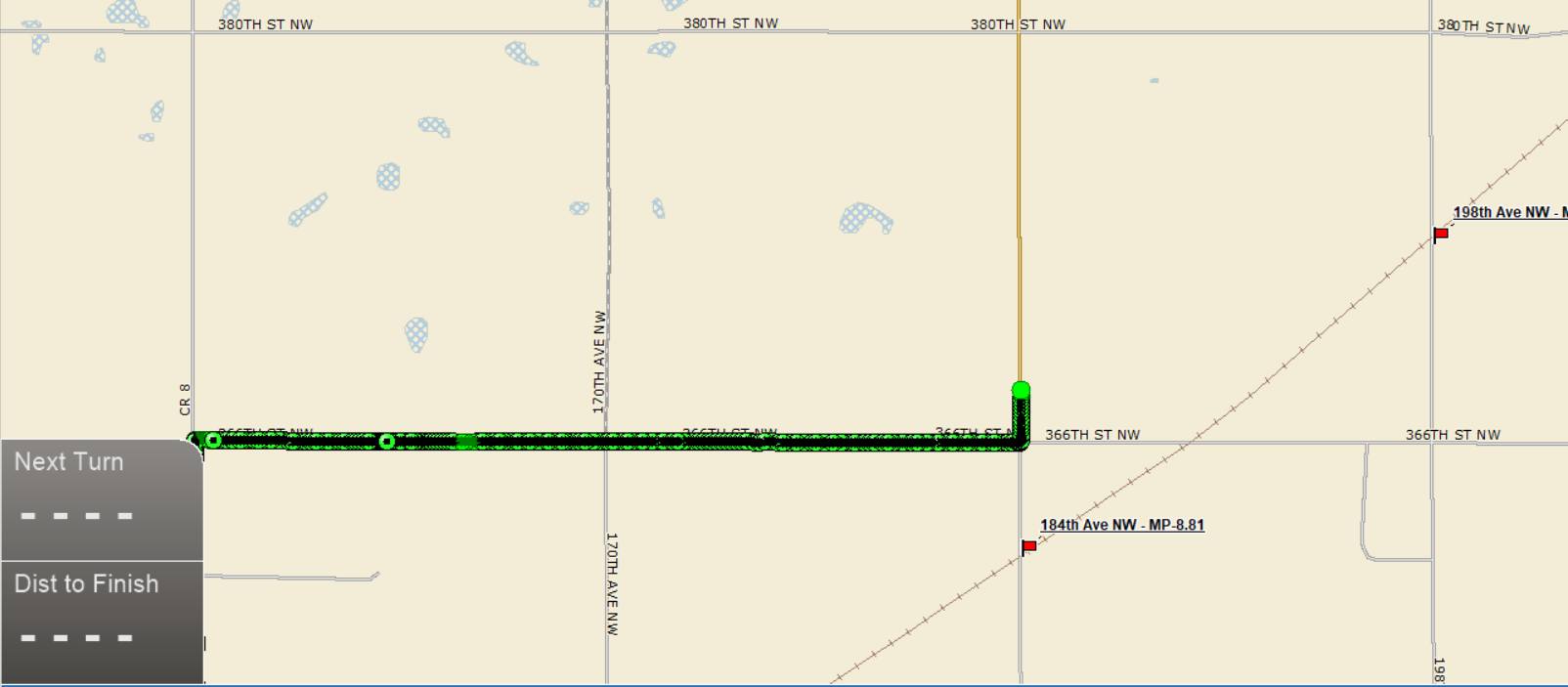
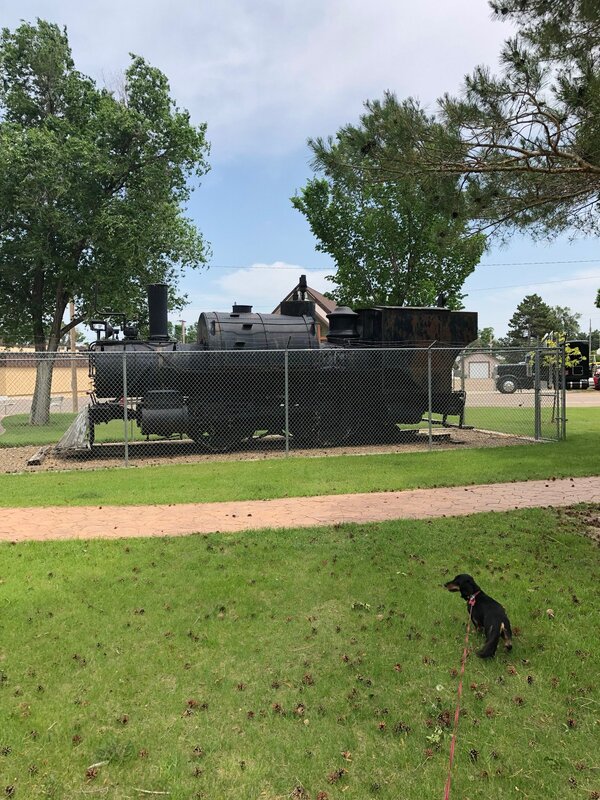
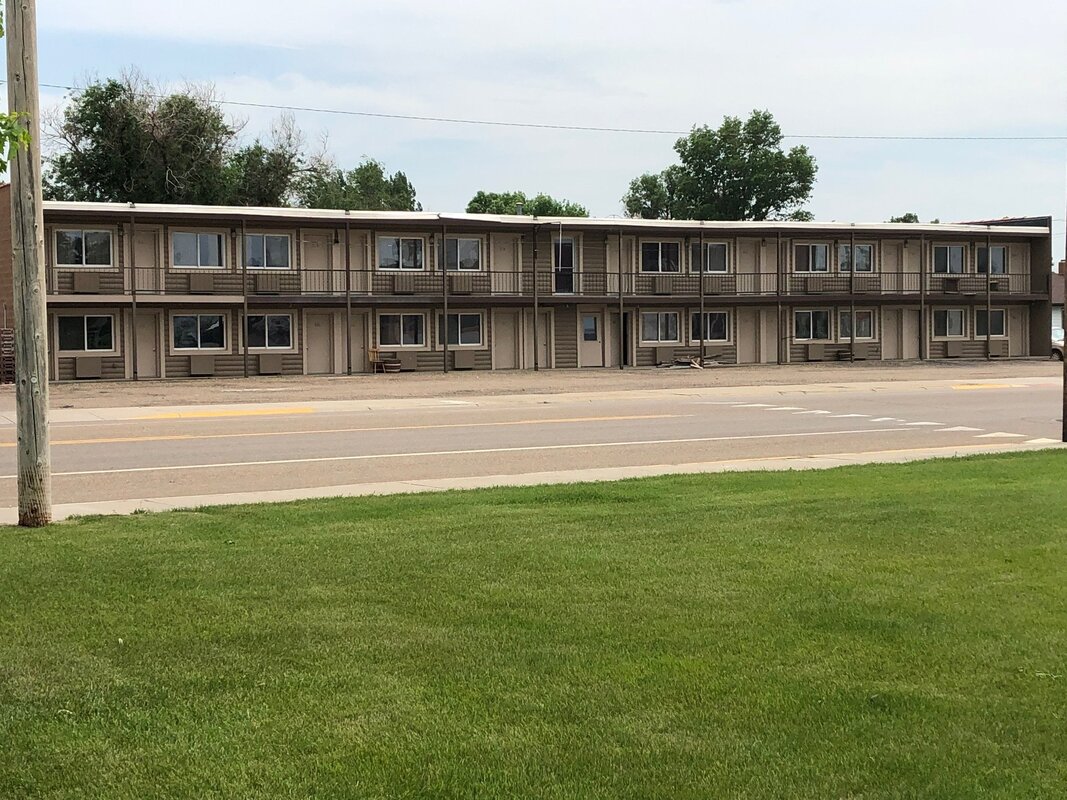
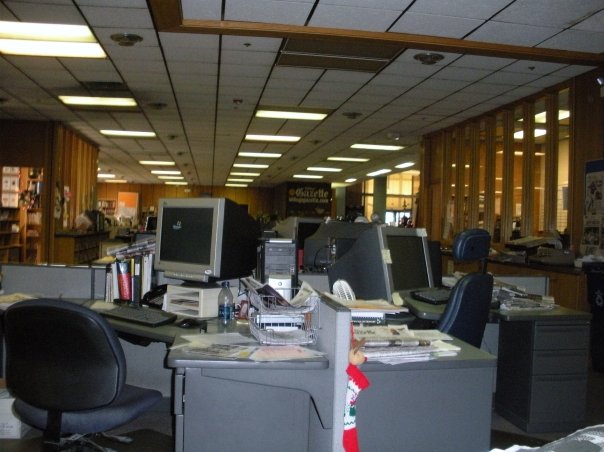
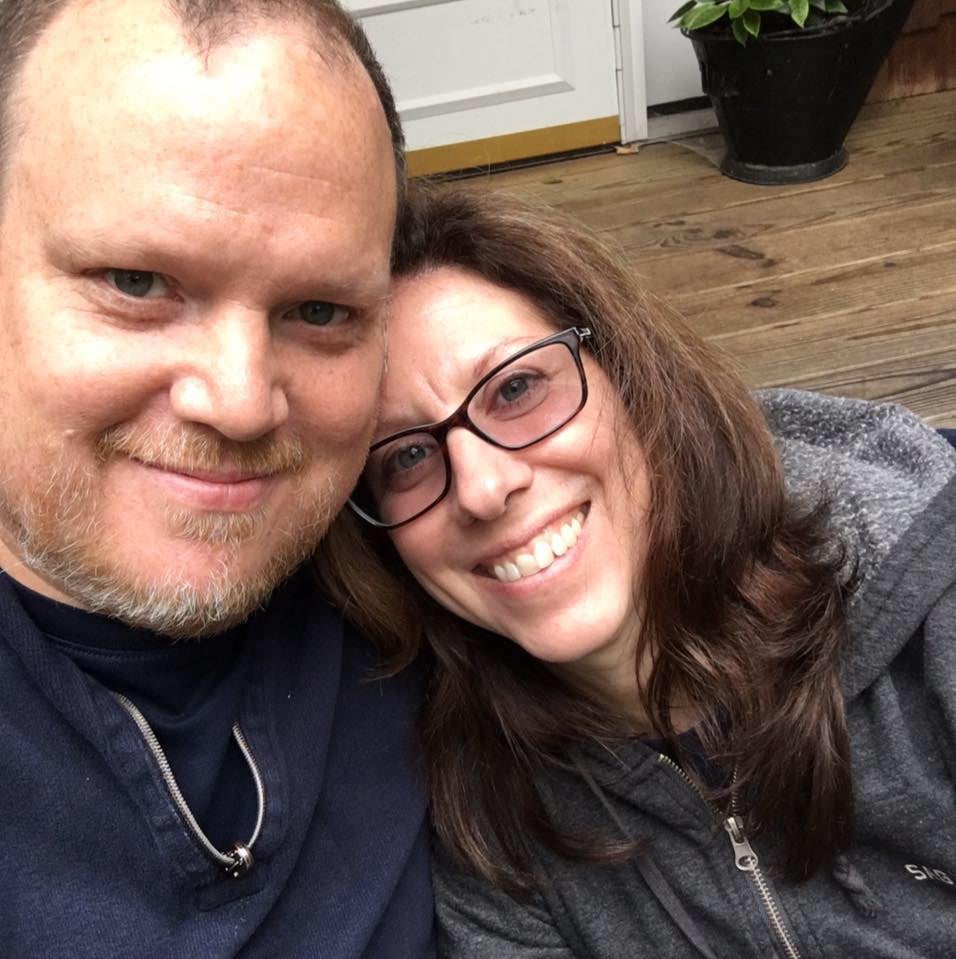
 RSS Feed
RSS Feed